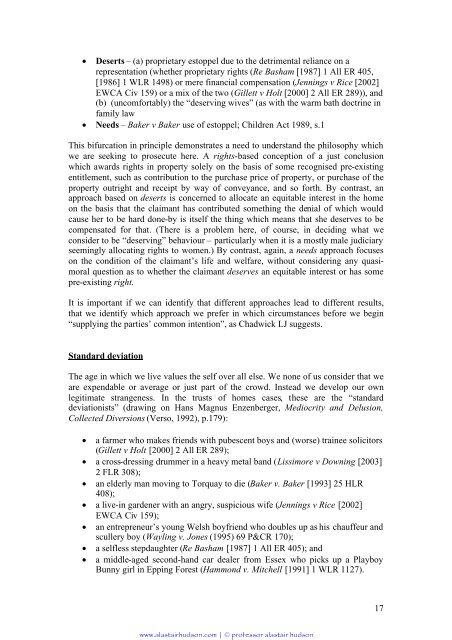England's dreaming equity, trust and conscience - alastairhudson.com
England's dreaming equity, trust and conscience - alastairhudson.com
England's dreaming equity, trust and conscience - alastairhudson.com
Create successful ePaper yourself
Turn your PDF publications into a flip-book with our unique Google optimized e-Paper software.
Deserts – (a) proprietary estoppel due to the detrimental reliance on arepresentation (whether proprietary rights (Re Basham [1987] 1 All ER 405,[1986] 1 WLR 1498) or mere financial <strong>com</strong>pensation (Jennings v Rice [2002]EWCA Civ 159) or a mix of the two (Gillett v Holt [2000] 2 All ER 289)), <strong>and</strong>(b) (un<strong>com</strong>fortably) the “deserving wives” (as with the warm bath doctrine infamily law Needs – Baker v Baker use of estoppel; Children Act 1989, s.1This bifurcation in principle demonstrates a need to underst<strong>and</strong> the philosophy whichwe are seeking to prosecute here. A rights-based conception of a just conclusionwhich awards rights in property solely on the basis of some recognised pre-existingentitlement, such as contribution to the purchase price of property, or purchase of theproperty outright <strong>and</strong> receipt by way of conveyance, <strong>and</strong> so forth. By contrast, anapproach based on deserts is concerned to allocate an equitable interest in the homeon the basis that the claimant has contributed something the denial of which wouldcause her to be hard done-by is itself the thing which means that she deserves to be<strong>com</strong>pensated for that. (There is a problem here, of course, in deciding what weconsider to be “deserving” behaviour – particularly when it is a mostly male judiciaryseemingly allocating rights to women.) By contrast, again, a needs approach focuseson the condition of the claimant’s life <strong>and</strong> welfare, without considering any quasimoralquestion as to whether the claimant deserves an equitable interest or has somepre-existing right.It is important if we can identify that different approaches lead to different results,that we identify which approach we prefer in which circumstances before we begin“supplying the parties’ <strong>com</strong>mon intention”, as Chadwick LJ suggests.St<strong>and</strong>ard deviationThe age in which we live values the self over all else. We none of us consider that weare expendable or average or just part of the crowd. Instead we develop our ownlegitimate strangeness. In the <strong>trust</strong>s of homes cases, these are the “st<strong>and</strong>arddeviationists” (drawing on Hans Magnus Enzenberger, Mediocrity <strong>and</strong> Delusion,Collected Diversions (Verso, 1992), p.179): a farmer who makes friends with pubescent boys <strong>and</strong> (worse) trainee solicitors(Gillett v Holt [2000] 2 All ER 289); a cross-dressing drummer in a heavy metal b<strong>and</strong> (Lissimore v Downing [2003]2 FLR 308); an elderly man moving to Torquay to die (Baker v. Baker [1993] 25 HLR408); a live-in gardener with an angry, suspicious wife (Jennings v Rice [2002]EWCA Civ 159); an entrepreneur’s young Welsh boyfriend who doubles up as his chauffeur <strong>and</strong>scullery boy (Wayling v. Jones (1995) 69 P&CR 170); a selfless stepdaughter (Re Basham [1987] 1 All ER 405); <strong>and</strong> a middle-aged second-h<strong>and</strong> car dealer from Essex who picks up a PlayboyBunny girl in Epping Forest (Hammond v. Mitchell [1991] 1 WLR 1127).17www.<strong>alastairhudson</strong>.<strong>com</strong> | © professor alastair hudson













